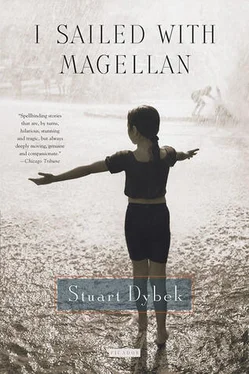It was a daredevil stunt I’d seen in Westerns when, to avoid gunfire, the cowboy hero, at full gallop, grabs the saddle horn, swings from the stirrups, and in a fluid movement hits the ground boots first and immediately bounds back into the saddle. As soon as I touched one foot to the street, the spinning pedal slammed into the back of my leg and I tumbled and skidded for what seemed half a block while the bike turned cartwheels over my body. Skin burned off my knees and palms. I’d purposely picked a street that was deserted to practice on. But a lady who could barely speak English poked her head out of a third-floor window and yelled, “Kid, you ho-kay?” She’d just witnessed what must have looked like some maniac trying to kill himself. I waved to her, smiled, and forced myself up. Amazingly, nothing was broken, not even my teeth, although I had a knot on my jaw from where the handlebars had clipped me with an uppercut. I collected my twisted bike from where it had embedded itself under a parked car. Had it been a horse, as I’d been pretending, I’d have had to shoot it. If someone had done to me what I’d just done to myself, I would have got the bastard back one way or another. My brother let me off easy.
But years later, when he was living in New York, studying acting with Brando’s famous teacher Lee Strasberg, Mick and I spent an evening together, drinking and watching a video of On the Waterfront. During the famous “I could have been a contender” scene, when Brando complains about his “one-way ticket to Palookaville” and tells his older brother, “Charley, it was you …. You was my brother, Charley. You should have looked out for me,” Mick turned to me, nodded, and smiled knowingly.
Chester was anything but a tough, yet despite his quiet way, you got the impression he’d lay his life on the line if anyone messed with Ralphie. You could see it in how he’d step out into a busy street, checking both directions for traffic before signaling Ralphie to cross. Or how, whenever a gang of guys playing keepaway with somebody’s hat, or maybe having a rock fight, barreled down the sidewalk, Chester would instinctively step between them and Ralphie.
That willingness to take a blow was an accepted measure of what the gang bangers called amor— a word usually accompanied by a thump on the chest to signify the feeling of connection from the heart-although in matters of amor, as in everything else, the willingness to give a blow was preferred. There were guys in the neighborhood who’d lay their lives on the line over an argument about bumming a smoke, guys capable of killing someone over a parking space or whose turn it was to buy the next round. There was each gang’s pursuit of Manifest Destiny: battles merciless and mindless as trench warfare over a block of turf. There was the casual way that mob goons across Western Avenue maimed and killed, a meanness both reflexive and studied — just so people didn’t forget that in capitalism on the street, brutality was still the least common denominator.
Not that there weren’t ample illustrations of that principle at the edge of the daily round of life where bag ladies combed alleys and the homeless, sleeping in junked cars, were found frozen to death in winter. Laid-off workmen became wife beaters in their newfound spare time; welfare mothers in the projects turned tricks to supplement the family budget; and it seemed that almost every day someone lost teeth at one or another of the corner bars.
The shout would go up—“Fight!”—and kids would flock in anticipation, especially if a couple of alkies were whaling at one another, because invariably loose change would fly from their pockets. The scramble for nickels and dimes would spawn secondary fights among us. And if we weren’t quick enough, we’d be scattered by Sharky, a guy who’d lost his legs in Korea, or riding the rails to Alaska, or to sharks off Vera Cruz, depending on which of his stories you wanted to believe. He was a little nuts, and people wondered if he remembered anymore himself where exactly his legs had been misplaced.
Sharky mopped up late at Juanita’s bar, but his main source of income was scavenging. He was also known as Gutterball for the way he’d rumble along alleys and curbs on a homemade contraption like a wide skateboard that he propelled with wooden blocks strapped over gloved hands, turning his hands into hooves. Late on summer nights, you could hear him clopping down the middle of deserted streets like a runaway stallion. Call him Gutterball to his face or get in his way, and he’d threaten to crack your kneecap with one of those wooden hooves.
It wasn’t an idle threat, he’d been in several brawls. They usually started with a question: “What the fuck you looking at, ostrich-ass?”
Anyone with legs was an ostrich to Sharky.
“Huh?” came the usual response.
But Sharky wouldn’t let it go at that. “Admit it, you rude motherfuck, you were staring at my bald spot, weren’t you?”
Sharky did have a bald spot. He’d roll slowly toward the confused ostrich, who’d begin edging backward as Sharky’s pace increased.
“You never seen a bald spot on wheels before? That it? I’m very fucken sensitive about my bald spot. Or is it something else about me that attracted your attention? Like, maybe, that I’m at a convenient height for giving head. You the kind of perv that wants a baldy bean doing wheelies while sucking your dick?”
By now, Sharky had gained momentum and was aimed for a collision if the ostrich didn’t take off running, which he usually did, with Sharky galloping after him, raging, “Run, you perverted, chickenshit biped!”
Sharky obviously enjoyed these confrontations. What nobody suspected was that such spectacles were only a substitute for what he really craved: a parade.
There was no shortage of parades in Little Village. Most ethnic groups had one, and that must have figured in Sharky’s thinking. St. Patrick’s brought out the politicians, and St. Joseph’s was also known locally as St. Polacik Day since people wore red, the background color for the white eagle on the Polish flag. I never understood what was particularly Polish about St. Joseph, but I bought a pair of fluorescent red socks especially for the occasion.
The Mexicans had two big holidays. The first was El Grito, a carnival at the end of summer, when as part of the festivities a wrestling ring was erected in the middle of Nineteenth Street. There’d be pony rides, and Mick and I would try to time it so as to be in the saddle when the El roared overhead because the ponies would rear.
The Feast of Our Lady of Guadalupe, the patron saint of Mexico, was more solemn. Each December twelfth, no matter the weather, a procession wound through the streets led by a plaster likeness of the Virgin who’d appeared not to the Spanish conquerors but to a poor Indian, Juan Diego. She’d imprinted her mestiza image on his cloak — a miracle still there for all to see at the basilica in Mexico City. She’d told Juan Diego to gather flowers for her in a place where only cactus grew. When he did her bidding, he found a profusion of Castilian roses, and so all through Little Village people carried roses and sang hymns in Spanish to the Virgin whose delicate sandal had crushed the head of Quetzalcoatl, the snake god ravenous for human sacrifice. Even the alderman and precinct captains marched holding roses. And each year there was the fantastic rumor that the great Tito Guizar, the Mexican movie star of Rancho Grande— a singing cowboy like Roy Rogers — would arrive on a palomino to lead the procession through the barrio. His movies played at the Milo theater on Blue Island, where they showed films in Spanish. I’d study the posters I couldn’t read and wonder if his rearing horse was a celebrity in Mexico, the way that Roy Rogers’s horse, Trigger, was a star in America.
Читать дальше












